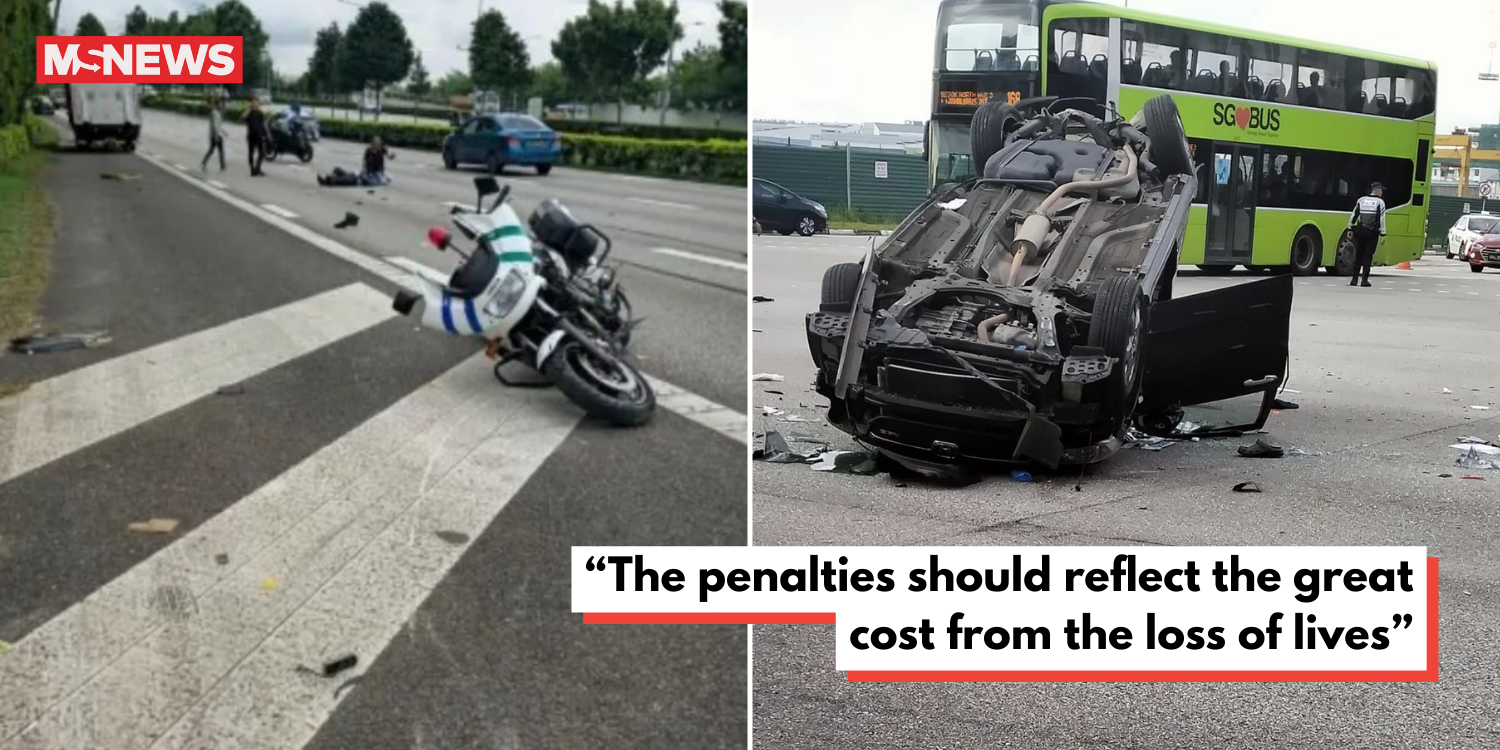Singaporeans polled ask for stricter penalties for errant motorists
The start of June was rocked by the death of 26-year-old Land Transport Authority (LTA) enforcement officer Zdulfika Ahakasah, who died after crashing into a kerb while chasing an 18-year-old errant motorcyclist.
LTA officer dies while chasing errant motorcyclist, purportedly supposed to get married next month
Unfortunately, this hasn’t been the only fatal traffic accident Singapore has had to face in recent months.
In April, a six-vehicle chain collision at a Tampines traffic junction killed 17-year-old Afifah Munirah Muhammad Azril and 57-year-old Norzihan Juwahib.
That same month, a collision between a motorcyclist and a minivan in Jurong East resulted in the former passing away.
The frequency of fatal accidents thus begs the question: Is enough being done to deter dangerous driving by motorists?
Speaking in Parliament on 7 May, Minister of State for Home Affairs Faishal Ibrahim addressed this issue, stating that current laws against errant motorists were quite stiff and thus “adequate”.
Whether this reflects public sentiment, however, is another matter entirely. A recent poll by Answers.sg found that 73% of respondents felt that current penalties against errant motorists were too lax.
73% of respondents think penalties against motorists are inadequate
According to an Answers.sg poll, 73% of 992 respondents found that current penalties against errant motorists were not harsh enough.
This translates to about 720 respondents feeling that there was something lacking, when it came to charging motorists for traffic violations.
Meanwhile, 27% of respondents, or 272 of them, voted otherwise on the poll. This implies that for them, current penalties were sufficient against errant motorists.
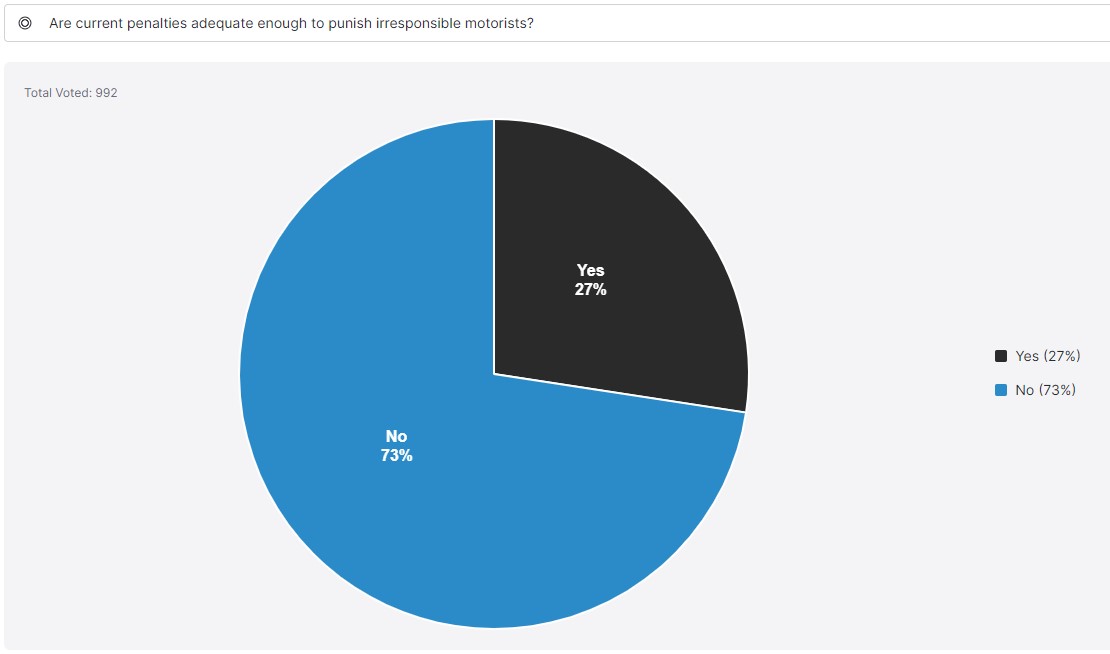
Source: Answers.sg
At present, these are the penalties for first-time offenders responsible for the following offences:
- Two to eight years for dangerous driving causing death
- One to five years for dangerous driving causing grievous hurt
- Additional one to two years imprisonment for drink driving causing death in addition to dangerous driving
- Additional six months to one year of imprisonment and fine of S$2,000 to S$10,000 for drink driving causing grievous hurt in addition to grievous hurt
More information on the penalties offenders are liable to for violating traffic laws is available here.
Motorists think penalties should reflect the cost of lives lost
The view that our current laws are not harsh enough on those violating traffic rules is indeed not an uncommon one.
Under a recent Reddit discussion thread about Mr Zdulfika’s death, many were in agreement that the punishment for the errant motorcyclist he was chasing had to be harsh.
However, one user opined that Singapore’s “laws are way too lenient”. They further noted that the culprit will likely be given a “short jail term and permanent ban” for driving or riding.
“Illegally rode a bike once, can easily do it again,” said the user.
Netizens on Facebook also expressed the fear that the expected punishment for the motorcyclist might not be severe enough.

Source: Facebook
MS News also spoke to drivers who echoed the same sentiment.
For instance, Nana, a 26-year-old pharmacist who drives a rented Ssangyong Tivoli, noted that penalties against those who caused traffic accidents were very much “insufficient.”
“The penalties should reflect the great cost from the loss of lives, limbs and any other physical or internal effect from these accidents,” said Nana.
She further stated that motorists have a responsibility to drive safely and follow the rules.
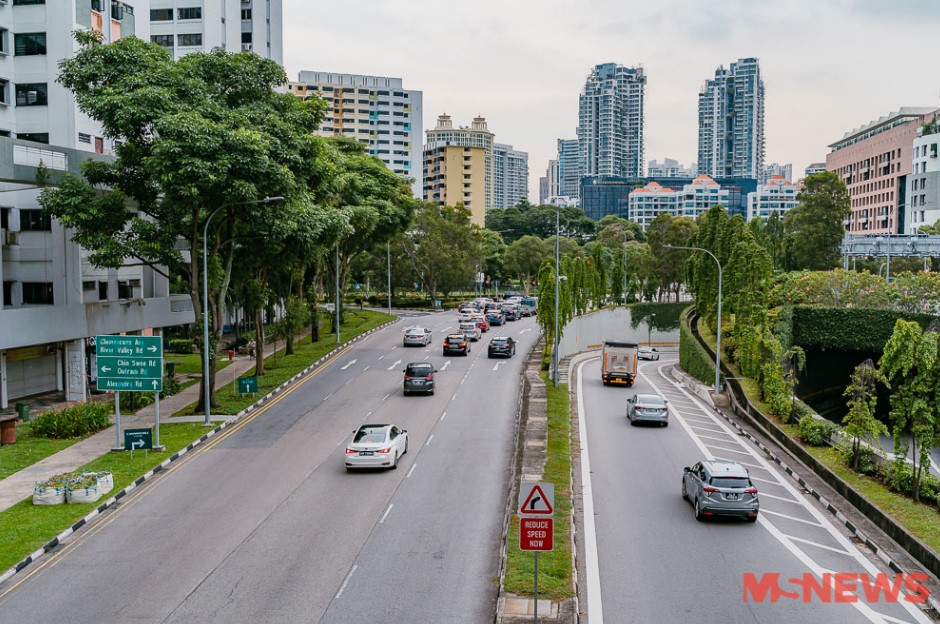
Another driver, 29-year-old IT analyst Tanya, agreed that the penalties were far too lax and not fair for the victims.
Noting that most motorists are impatient and rude, she also claimed that they attempt to overlook rules for their convenience.
“Once they get used to this behaviour, they will end up not following traffic rules and cause accidents,” said Tanya.
Drivers should bear the consequences of choices made on the road
Referring to drink driving in particular, Tanya pointed out that driving while under the influence is a conscious choice made by the motorist.
As such, they should bear the consequences.
Another motorist MS News spoke to, 31-year-old data analyst Farhan, said:
“There are drivers still on the road who think they own the roads and have the right of way all the time.”
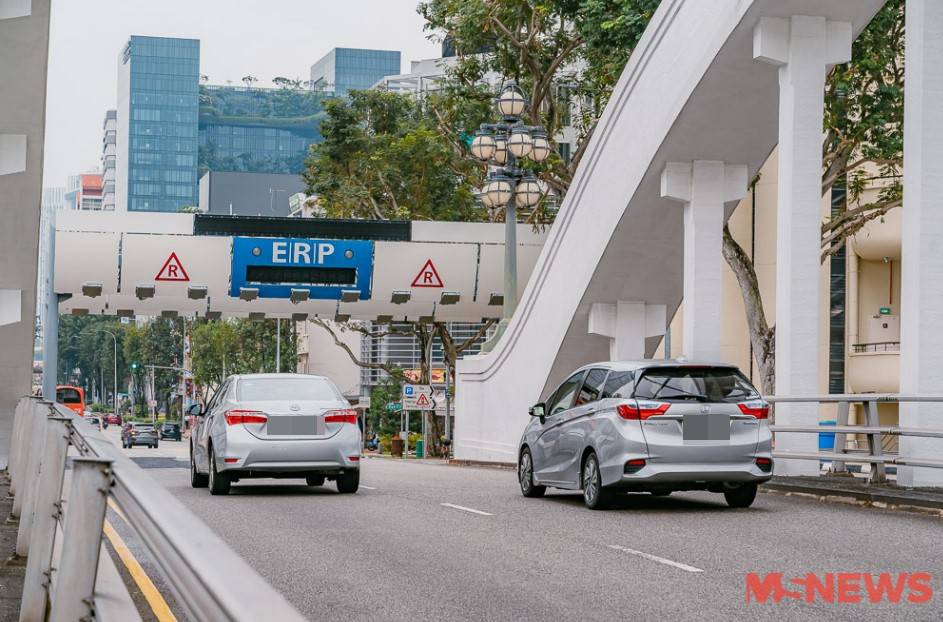
He claimed that it was this careless attitude that resulted in the fatal accident at Tampines, resulting in the death of two innocent victims.
However, a driver who wished to be known as Kevin, a 32-year-old marketing assistant, said that he felt the penalty to be a fair one, especially if it did help in reducing the number of cases of dangerous driving causing death.
“If not, there might be a need for a harsher penalty,” he said.
Penalties against errant motorists should be increased: Netizens
If current penalties for offenders who violate traffic laws are too lax, what, then, is the appropriate punishment for such individuals?
Recently, a netizen asked users on Hardware Zone Forum if there should be an increase to the penalties for offenders.
93.5% of respondents voted yes, with one commenter noting that the punishment should be doubled or tripled to be truly effective.
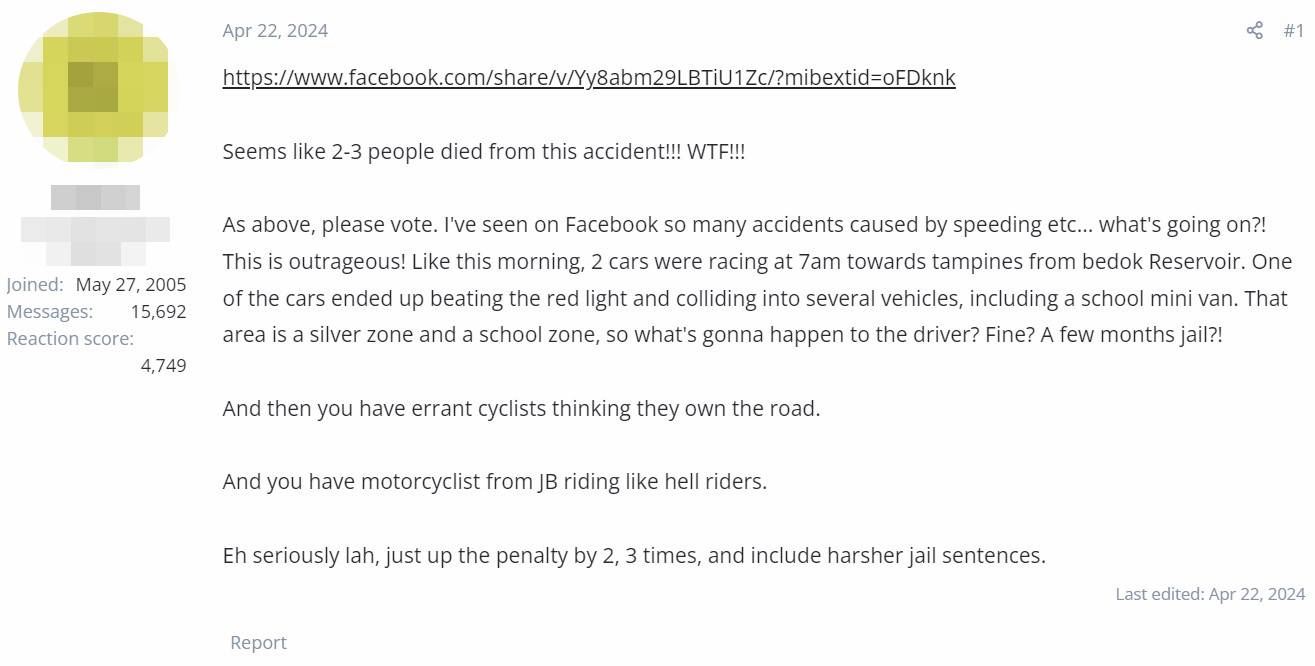
Source: Hardware Zone Forum
Some went so far as to suggest the death penalty for those responsible for causing such incidents.

Source: Hardware Zone Forum
Ultimately, most commenters were in agreement that the punishment for offenders was far too light — a sentiment that motorists MS News spoke to shared.
When asked what the penalty for dangerous driving causing death should be instead, Nana suggested that the sentence be 10 years at least.
Meanwhile, those who also drove while intoxicated should face an extra 10 to 20 years in jail.
Meanwhile, Tanya suggested it to be an additional five years, while Farhan said that setting a jail sentence of at least 10 years would be a far more effective deterrent.
Experts say punishments for errant driving are often severe
Of course, the severity of the punishment motorists face can differ on a case-by-case basis.
Mr Sanjiv Vaswani of the Vaswani Law Chambers LLC Team noted that generally, penalties for traffic incidents — especially those causing death — would be significantly harsh on the ones responsible.
Speaking to MS News, he said sentences for drivers causing death by reckless or negligent driving could go up further by a maximum of four years beyond what is stated if the driver was a serious repeat offender.
“What this means is that the courts already have a wide range on what sentence to impose,” he emphasised.
“The courts have to decide the appropriate sentence based on numerous factors, including whether the victim was themselves partly responsible for their unfortunate demise.”
Ms Vivienne Sandhu of the Clifford Law LLP Team also told MS News that penalties that local courts impose for drink driving is dependent on a number of factors.
These include the amount of alcohol, consequences of the act, and other circumstances.
As for reckless or dangerous driving causing death, the punishment faced would be more severe.
High-profile traffic cases often evoke emotional responses
When asked about the public perception of penalties being lax, Ms Sandhu said:
“People may think that the penalties are too lax because of the spate of high-profile road traffic accidents that result from errant drivers.”
“These are accidents where there were tragic loss of life and injuries. People in Singapore are affected by such news and feel for these victims,” she added.
It is only natural that Singaporeans polled think that the penalties for errant motorists are too lax.
Mr Sanjiv noted that public sentiment towards the severity of penalties depended on the emotional connection felt with the victims involved in the incident.
He then noted that the purpose of punishment is primarily deterrence.
“The offender who is jailed three years for taking a life may swear he will never do it again, and that the punishment was more than enough for him,” Mr Sanjiv added.
“For the family members who lost their loved one, three years is probably nothing for the impact this has had on them.”
“If the victim was young, or the sole breadwinner of the family, their family would be even more angered by the offender’s actions, and want retribution,” he added.
Road fatalities at a high since 2016
How effective penalties have been thus far as a deterrent, however, is another matter entirely.
For instance, Ms Sandhu noted that there were 136 fatalities in 2023, the highest since 2016, when there were 141 fatalities.
Motorcyclists and pillion riders accounted for half of all road fatalities, while elderly pedestrians made up nearly 20%.
The number of speeding-related fatal accidents also increased by 83.3% from 18 cases in 2022 to 33 in 2023.
“These are concerning figures,” Ms Sandhu said, though she noted that the traffic police is increasing the composition sums and demerit points for certain traffic offences later in the year.
The importance of faith in the judicial system
Mr Sanjiv stated that whether harsher penalties should be imposed in any case was a matter of perspective.
“Some people drink and drive foolishly out of convenience. We need to deter such behaviour and stiffer penalties is just one way to do that,” he said. “People seldom drive out to drink alone.”
“So if you know the person you are drinking with drove to meet you and is likely to drive back, perhaps it is time for you to speak up and say ‘Hey, stop it, this is not right’.”
He also felt that there needed to be a belief in the functionality of the judicial system.
“In my view it is important to have faith in the judicial system, and trust that the judges do what is right and just based on all the facts and circumstances of the case, not just what we see or hear, be it in the mainstream, alternative or social media.”
Onus is on motorists to drive safely
Of course, penalties aren’t the only means by which to deter motorists from recklessly or negligently driving.
Singapore has often conducted educational campaigns to teach road users about the laws of our local roads.
For instance, the annual Anti-Drink Drive Campaign instills in motorists the importance of refraining from drinking and driving.
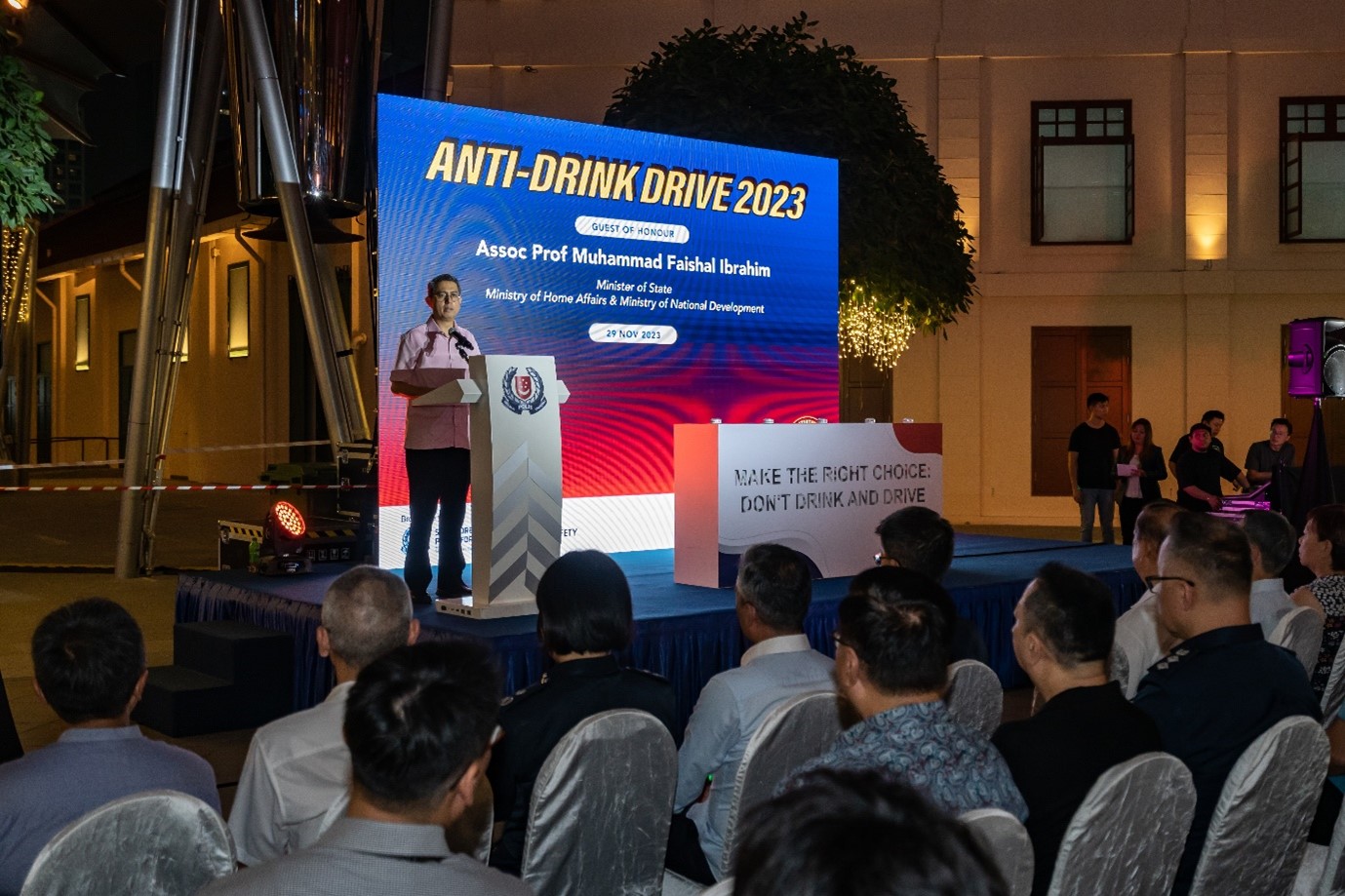
Source: Singapore Road Safety Council
“The Traffic Police has been increasing its education and engagement efforts to encourage the public to adopt good road safety habits,” Ms Sandhu said.
Even so, she admitted that more was necessary to educate motorists about safe driving.
“Instilling a culture of safe driving in Singapore is important to ensure road safety for all,” she said.
“The government can consider increasing the difficulty level of driving tests. Advertisements can also be put up to remind road users to be safe to reduce the number of accidents on the road.”
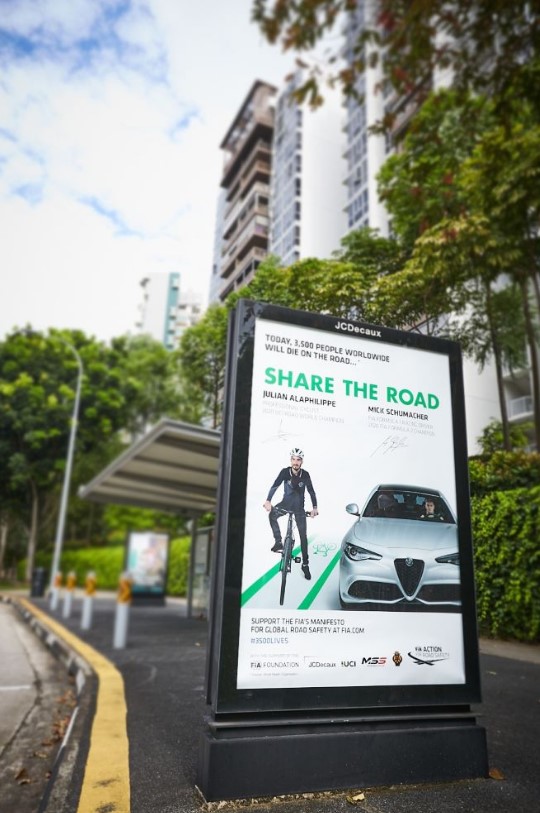
Source: AA Highway
Similarly, Tanya noted that campaigns may not be enough to deter motorists.
“People generally will ignore… they assume that they are in control of themselves and their vehicle,” she said. “That being said, we should start educating students from young. It is easier to shape a young person’s mind.”
Kevin also noted that the onus was on members of the public to exercise what they had learnt and act with consideration towards pedestrians and fellow drivers.
“If the people themselves don’t follow, then there’ll be no significant progress,” he said.
Have news you must share? Get in touch with us via email at news@mustsharenews.com.
Featured image adapted from SGRoad Blocks/Traffic News on Telegram and Facebook.
